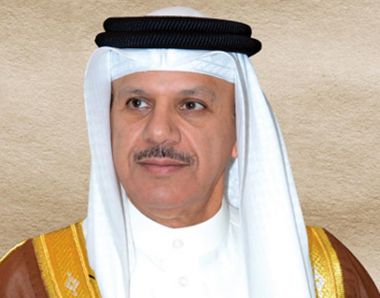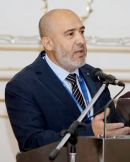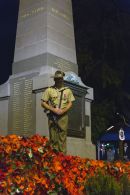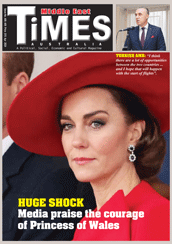| Cover |
|
| GCC: Security pact endorsed | |
 |
|
GCC: Security pact endorsed
he leaders of the Gulf Cooperation Council (GCC) last month endorsed an agreement that will promote collective security among the six member states. Abdul Latif Al Zayani, the GCC secretary-general, said at a press conference in Riyadh following the 14th GCC Consultative summit that all the countries approved the accord and that the leaders have instructed their interior ministers to sign it. The agreement stipulates full cooperation between member states and mutual responsibilities to preserve their collective security and stability. It also highlights the need to promote common security arrangements to the highest standards to help combat transnational and organised crime. It also boosts full compliance with the law by all GCC citizens in the member states. Initial agreement The initial security agreement was announced in Manama in December 1994, but only Bahrain, Saudi Arabia and Oman endorsed it. Qatar followed in 2009. The GCC leaders at their 2010 summit in Kuwait called for its upgrade by a committee from experts and specialists from the GCC states. The support by the six member states is seen as an outstanding step forward in the Council’s history. Support to UAE In his remarks at the consultative summit press conference, Prince Saud Al Faisal, the Saudi foreign minister, said that the GCC fully supported the UAE in its conflict with Iran over the occupied UAE islands and praised its “wise vision in solving the case peacefully.” Prince Saud also blasted Tehran over its stance towards Bahrain and a likely union with Saudi Arabia. “Iran has no right whatsoever to interfere in the talks and measures between Bahrain and Saudi Arabia, even if it is the union,” he said. Earlier, Tehran said 190 lawmakers opposed the union between Manama and Riyadh, claiming such a move would destabilise the region. However, Prince Saud rejected the allegations and said that the GCC did not mind Iran uniting with any country it liked and hoped that Tehran would respect the good neighbourhood relations with the GCC states. The Saudi foreign minister said that the GCC leaders had postponed the announcement of a Gulf union to allow time for further studies and research that would ensure a smooth and clear transition that would not allow room for misinterpretation. Al-Zayyani lauds outcome of GCC interior ministers’’ meeting Secretary-General of the Gulf Cooperation Council (GCC) Dr. Abdullatif Al-Zayyani said night the just-ended 13th consultative meeting of the GCC interior ministers reached results that will help guard against the common security hazards facing the GCC countries. Speaking to reporters after the meeting, Dr. Al-Zayyani said the ministers reaffirmed pledge to coordinate the efforts of the security services of their countries in the face of the common challenges. “The GCC countries face a tendentious media campaign that aims to instigate sectarianism and undermine the stability and security of our countries,” he cautioned. “The interior ministers appreciated the adoption by the GCC leaders of the initiative of Saudi King Abdullah bin Abdulaziz for the GCC transition from cooperation to union. “They renewed commitment to collective security which is the key for protecting the achievements made by our countries in economic and social domains,” Dr. Al-Zayyani pointed out. GCC union sought for security, prosperity The six-nation Gulf Cooperation Council (GCC) must work “hard” toward economic and political union to ensure the safety and prosperity of its people, said Prince Saud Al-Faisal, Minister of Foreign Affairs and Chairman of the Institute of Diplomatic Studies. Prince Saud made the comments in a speech last month delivered on his behalf by Prince Abdul Aziz Bin Abdullah, Deputy Minister of Foreign Affairs, on the opening day of “The Conference of Gulf Youth: Arab Gulf States — From Cooperation to Union” organized by the Institute of Diplomatic Studies. The minister said that the region is facing many economic, political and social challenges. These include the “escalation of confrontation between Iran and the international community over its nuclear program, its constant provocation of GCC countries in particular, the continued suffering of the Palestinian people” and the Arab Spring. “All these developments require us to pause for reflection and [develop a] strong will to deal with them in the interest of GCC states … territorial integrity, civil peace, stability and growth.” “These threats require hard work from the GCC countries to shift from the current formula of cooperation to a union formula acceptable to the six countries to ensure their security and stability, and the durability of their economies.” Prince Saud said the Arab Gulf region is important “due to its strategic location and large reserves of oil and gas, which are the most important sources of energy in the world”. He said it was not possible to deal with these challenges as individual states. Prince Saud said it was King Abdullah, Custodian of the Two Holy Mosques, who first “recognized the importance of the transition” from cooperation to a union. in his opening address to the 32nd GCC summit in Riyadh in December last year. He said the proposal was subsequently formally adopted by the summit and a program of action was formulated, with the results forwarded to the next consultative summit. Prince Saud said a union would see the formation of a GCC supreme body to coordinate foreign policy decisions to benefit all member nations. “When the six GCC states collectively negotiate with other states in a federal structure, this will strengthen the bargaining power of our countries.” |
- King Abdullah a statesman par excellence Saudi King urges Islamic unity
- Princess Sabeeka of Bahrain Attends “Freedom Palm”
- Queen watches armed forces parade at Windsor Castle for diamond jubilee




















